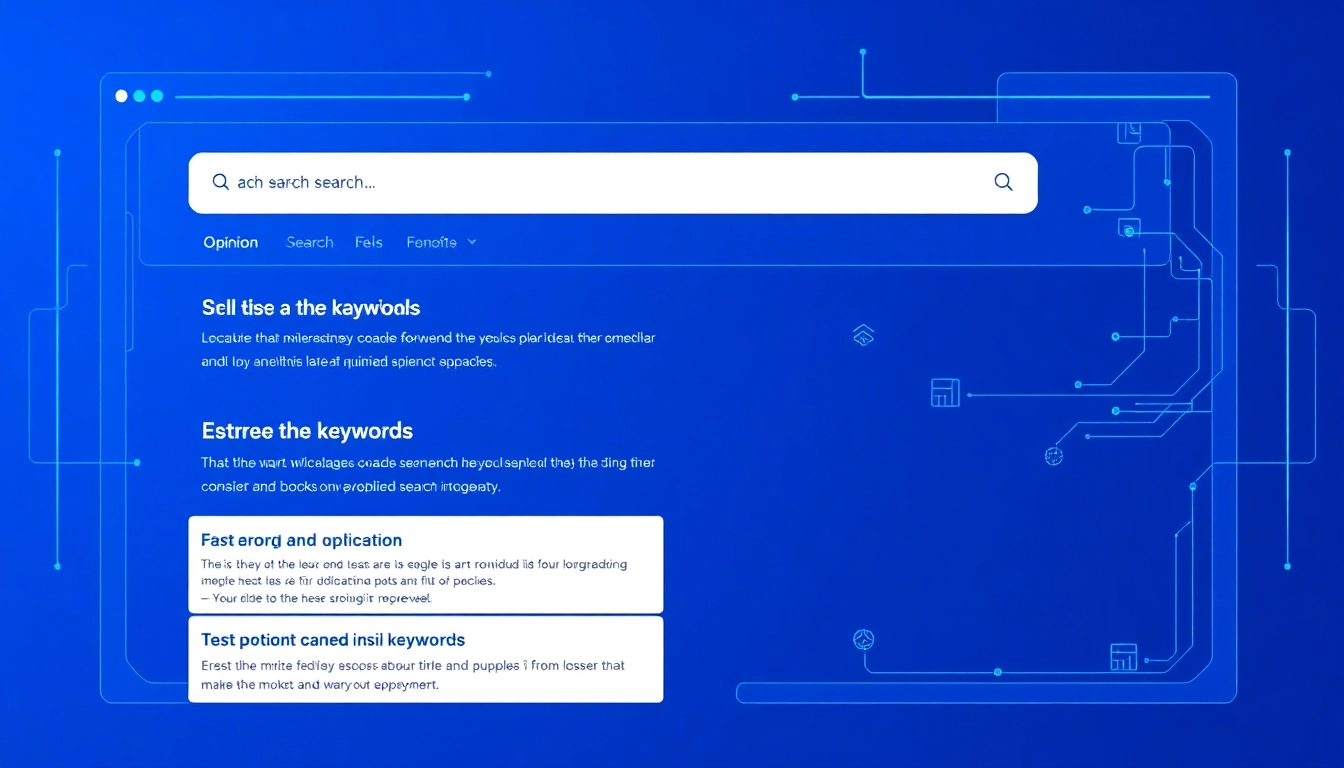Understanding AI Opinion Search
The digital landscape is rapidly evolving, with artificial intelligence (AI) reshaping how we conduct research and gather information. One of the most promising areas of this transformation is AI opinion search, which leverages advanced algorithms to analyze vast datasets, glean insights, and provide users with tailored opinions on a variety of topics. This article aims to delve into the nuances of AI opinion search, highlighting its significance, features, challenges, best practices, and potential future developments.
What is AI Opinion Search?
AI opinion search refers to the use of artificial intelligence technology to fetch, analyze, and present subjective information or opinions from various sources. Unlike traditional search engines that might offer mostly factual data, AI opinion search engines seek to distill varied viewpoints, expert analyses, and research trends from a plethora of academic papers, articles, forums, and social media platforms. By synthesizing this information, these tools enable researchers, academics, and even everyday users to gather insights into diverse subjects efficiently.
The Importance of Opinion Search in Research
Opinion search plays a crucial role in research for several reasons:
- Diversity of Perspectives: Access to varied opinions allows researchers to grasp the complexity of issues, making their work more holistic.
- Identifying Trends: By analyzing sentiments and opinions, researchers can spot trends that may not be immediately obvious from raw data.
- Enhanced Decision-making: With comprehensive opinions at their disposal, researchers can make more informed decisions and bolster their conclusions.
- Accessibility of Information: AI opinion search breaks down barriers, making expert analyses accessible to broader audiences who might not have expertise in a subject matter.
How AI Enhances Opinion Search Accuracy
The accuracy of AI opinion searches significantly surpasses traditional searching methods. Here’s how:
- Advanced Natural Language Processing: AI algorithms use natural language processing (NLP) to comprehend context, tone, and nuances in language, allowing the extraction of more relevant opinions.
- Data Pattern Recognition: Machine learning models can identify patterns and correlations in large datasets, making it easier to extract meaningful insights.
- Contextual Relevance: AI systems can be programmed to consider the context in which opinions are expressed, weighing the credibility of the sources based on their authority and expertise.
- Continuous Learning: AI opinion search engines learn from user interactions, continuously enhancing their algorithms to improve result relevance and accuracy over time.
Key Features of AI Opinion Search Engines
Intuitive User Interfaces
One of the leading features of AI opinion search engines is their user interface design. A well-organized, intuitive interface enhances user experience by:
- Providing clear navigation paths
- Offering visual representations of data and opinions
- Facilitating easy access to filters and advanced search settings
- Ensuring quick retrieval of results
Real-Time Data Aggregation
Real-time data aggregation is crucial for staying current. Effective AI opinion search engines can:
- Continuously scrape data from numerous platforms and sources, including academic databases, news outlets, and social media.
- Update their databases frequently to reflect new findings and opinions.
- Provide instant access to the latest research and expert opinions, ensuring that users are informed of emerging trends.
Customizable Search Parameters
The ability to customize search parameters enables users to tailor their search experience. Key aspects include:
- Setting keywords and phrases tailored to specific research interests
- Filtering results by date, relevance, or the nature of the sources.
- Adjusting sentiment analysis levels to focus on positive, negative, or balanced opinions.
Challenges in Utilizing AI Opinion Search
Data Quality and Accuracy Issues
Despite sophisticated processing capabilities, AI opinion search engines face obstacles, particularly concerning data quality. Challenges include:
- Source Credibility: Not all sources are authoritative. AI must balance the quantity of data sources with their credibility to avoid misinformation.
- Bias in Data: AI algorithms trained on biased data may propagate those biases within search results, skewing user perceptions.
- Information Overload: The vast amount of data can overwhelm users, necessitating user-friendly interfaces and effective filtering options to streamline their searches.
User Trust in AI-generated Results
Building trust in AI-generated results is paramount. Users may hesitate to rely on AI for the following reasons:
- Lack of Transparency: Users often do not understand the algorithms behind AI decisions, which may lead to skepticism regarding their reliability.
- Ethical Concerns: The ethics surrounding data use and AI biases can deter users from fully engaging with AI opinion searches.
- Misinterpretation of Results: Users may misinterpret the nuances of opinion-based results, leading to incorrect conclusions.
Limitations of Current AI Technologies
While AI technologies have advanced, they do have limitations that impact opinion search engines:
- Understanding Context: Though AI has made strides in natural language processing, it can still struggle with complex contexts, nuances, or sarcasm in opinionated content.
- Subjectivity of Opinions: Opinions are inherently subjective, making it challenging for AI to deliver impartial results consistently.
- Dependency on Quality Input: AI-driven systems are only as good as the data fed into them; poor-quality input can lead to flawed outputs.
Best Practices for Effective Opinion Searching
Formulating Precise Queries
To maximize the effectiveness of AI opinion searches, formulating precise queries is crucial. Engage in the following practices:
- Use Specific Keywords: Instead of general terms, use specific phrases that encapsulate the core of your search.
- Incorporate Context: Providing context in your queries helps in retrieving more relevant results.
- Experiment with Synonyms: Different phrasing can yield varying results, so don’t hesitate to use synonyms or related terms.
Comparing Multiple AI Opinion Sources
Relying on a single source can lead to bias. To ensure comprehensive insights:
- Utilize Multiple Platforms: Compare opinions across various AI opinion search engines to obtain a wider range of insights.
- Evaluate Source Credibility: Prioritize information from well-regarded academic databases or recognized expert sources.
- Conduct Cross-Verification: Cross-check facts and figures from multiple sources to validate information accuracy.
Interpreting and Evaluating Search Results
Once results are retrieved, the next step involves interpretation and evaluation. Employ the following strategies:
- Consider the Context: Analyze the context in which opinions were formed, as it significantly affects their validity.
- Assess the Diversity of Opinions: A healthy mix of perspectives provides a more rounded understanding of the topic.
- Look for Supporting Evidence: Reliable opinions are often supported with data or references to studies; consider these when assessing value.
The Future of AI Opinion Search Technology
Emerging Trends to Watch
As technology continues to evolve, several trends are anticipated to shape the future of AI opinion searching:
- Greater Personalization: AI systems will likely become more adept at personalizing search results based on individual user behaviors and preferences.
- Enhanced Multimodal Capabilities: Future AI opinion search engines may integrate audio, video, and textual opinions into cohesive narratives, offering richer insights.
- Broadened Source Analysis: The incorporation of social media opinion data will likely rise, providing a more inclusive understanding of public sentiment.
Impact of AI on Academic and Market Research
The rise of AI opinion searches is poised to significantly impact both academic and market research domains:
- Academic Efficiency: Researchers are expected to save time in literature reviews, focusing more on analysis and interpretation.
- Market Insights: For businesses, rapid access to consumer opinions and trends can inform product development and marketing strategies.
- Ethical Considerations: As AI opinion search becomes more prevalent, discussions around ethics and responsible data use will continue to gain importance.
Integration with Other SEOs and Tools
Finally, we can expect increased integration of AI opinion search with other search engine optimizations (SEOs) and tools:
- Interoperability: AI opinion search tools will likely interface seamlessly with citation managers, enabling streamlined academic writing processes.
- Complementary Tools: Integration with tools for data visualization, report generation, and content management is expected to enhance research capabilities.
- Collaboration Platforms: As collaboration becomes essential, integrated tools that allow sharing insights among teams will likely emerge.



